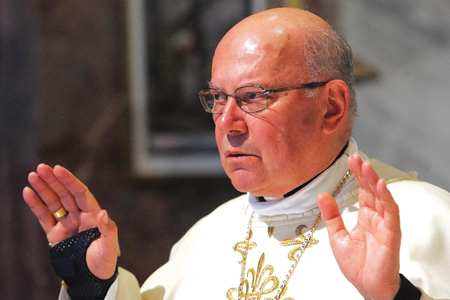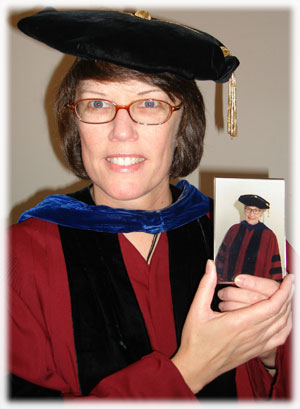The Investigation of the LCWR
The Leadership Conference of Women Religious (LCWR), an association that icludes the leadership of most U.S. women’s congregations, is under investigation by the Vatican.
Cardinal Levada said the assessment of the LCWR will be conducted by the Bishop of Toledo, Ohio, Leonard P. Blair. Bishop Blair is a member of the U.S. Conference of Catholic Bishops’ Committee on Doctrine. 
The Vatican assessment became necessary, according to Levada, because at the 2001 meeting between LCWR and the Congregation for the Doctrine of the Faith, which took place in Rome, the women were invited “to report on the initiatives taken or planned” to promote the reception of three areas of Vatican doctrinal concern: the 1994 apostolic letter Ordinatio sacerdotalis, the 2000 declaration Dominus Jesus from the Congregation for the Doctrine of the Faith, and “the problem of homosexuality.”
Cardinal Levada informed conference leaders: “Given both the tenor and the doctrinal content of various addresses given at the annual assemblies of the Leadership Conference of Women Religious in the intervening years, this Dicastery can only conclude that the problems which had motivated its request in 2001 continue to be present.”
The National Catholic Reporter, an independent newspaper, said the Vatican ordered the probe because the sisters had not addressed issues raised by the Vatican in 2001 about their promotion of church teaching on homosexuality, salvation and the priesthood, which the Vatican said is reserved for men.
The ripples from a keynote by Sinsinawa Dominican Sister Laurie Brink at the 2007 LCWR assembly roused the Vatican machinery into action. 
In that keynote address, titled A Marginal Life: Pursuing Holiness in the 21st Century,” Sr. Laurie Brink urged leaders of Catholic religious orders to make clear, if painful choices about the future of religious life. She began with this assumption: “Old concepts of how to live the life are no longer valid.” The rest of the speech outlined four possible options or outcomes as a starting point for discussion.
– “Death with dignity and grace” as opposed to becoming a “zombie congregation” that staggers on with no purpose. This option must be taken seriously, since the average age of the 67,000 sisters and nuns in the United States is 69. Many retreat ministries are closing, and large “mother houses” are struggling with finances, while some congregations no longer invite or accept new candidates.
– Brink noted that some orders have chosen to turn back the clock – thus winning the favor of Rome. “They are putting on the habit, or continuing to wear the habit with zest…Some would critique that they are the nostalgic portrait of a time now passed. But they are flourishing. Young adults are finding in these communities a living image of their romantic vision of religious life.”
– During this era of crisis and decline, some Catholic religious orders have chosen to enter a time of “sojourning” that involves “moving beyond the church, even beyond Jesus.” “Religious titles, institutional limitations, ecclesiastical authorities no longer fit this congregation, which in most respects is post-Christian,” added Brink, a former journalist who is a biblical studies professor at Chicago’s Catholic Theological Union.
For these women, the “Jesus narrative is not the only or the most important narrative…They still hold up and reverence the values of the Gospel, but they also recognize that these same values are not solely the property of Christianity. Buddhism, Native American spirituality, Judaism, Islam and others hold similar tenets for right behavior within the community, right relationship with the Earth and right relationship with the divine.”
She described the Benedictine Women of Madison as having a commitment to “ecumenism” which led them “beyond the exclusivity of the Catholic Church into a new inclusivity, where all manner of God is welcomed. They are certainly religious women, but they are no longer women religious as it is defined by the Roman Catholic Church. They choose as a congregation to step outside the Church in order to step into a greater sense of holiness.”
– Finally, some women are fighting on, hoping to achieve reconciliation someday with a changed, egalitarian church hierarchy. “Theologians are denied academic freedom. Religious and laywomen feel scrutinized simply because of their biology. Gays and lesbians desire to participate as fully human, fully sexual Catholics within their parishes,” Brink said. Many Catholics also oppose the “ecclesial deafness that refuses to hear the call of the Spirit summoning not only celibate males, but married men and women to serve” as priests.
Read Brink’s 2007 address and the keynotes from the LCWR 2008, 2006, 2005, 2004, 2003 and 2003 assemblies here.
The blog, Journey to a New Pentecost, provided a very crisp and thorough assessment of the LCWR investigation. You can read it here.
Brink’s comment about being “post-Christian,” and the sentence: “They are certainly religious women, but they are no longer women religious as it is defined by the Roman Catholic Church,” may have been the spark that ignited the gas can.
Amy Welborn, a Catholic blogger who writes on Beliefnet said: “If you are going to be post-Christian, then be post-Christian. I don’t say that with snark. It’s just reality. If you’ve moved on – move on. Step out from the protective mantle of identity that gives you cachet, that of ‘Catholic nun.'”
Here was a comment on America Magazine’s blog that summed things up for this conservative reader: “The Vatican investigation is long overdue. If you want to be a social worker then be a social worker–not a nun. A nun’s first allegiance is to the Church. I am quite tired of running into nuns who: look like aged hippies, push for women’s ordination, push for abortion, push homosexuality as an ok lifestyle and do this, supposedly, in the name of Christ.”
Sr. Jeannine Gramick, former co-director of New Ways Ministry, commented on the probable political reasons for the investigation: “It is difficult for me to believe that the CDF (Congregation for the Doctrine of the Faith) has not already made a predetermined conclusion. This seems to be the Vatican’s modus operandi. An “investigation” process puts a veneer of fairness to the result. Consider the investigations of theologians like Charles Curran, Leonardo Boff, Roger Haight, etc. etc. No matter what the investigating party does to please them (or not please them) the outcome will be the same. For example, in the Vatican investigation of Fr. Robert Nugent and me, Bob agreed to make some “profession of faith” about the church’s teaching on homosexuality while I refused. The sanction for each of us was identical.”
“In this case, I expect the predetermined outcome to be a change in the canonical relationship of LCWR to the Vatican. The Council of Major Superiors of Women Religious (CMSWR), the traditional group of nuns formed in 1192 by Cardinal Hickey, was not to be the official group representing women religious to the Vatican. By 1195, they not only had canonical status but also were favored over LCWR (e.g., CMSWR had more delegates than LCWR at the synod on Religious Life.) The Vatican would like CMSWR to be the official representative of the leaders of US women’s communities. I think the Vatican is using this investigation to usurp LCWR’s role and replace them with CMSWR.”
I agree with Amy Welborn. I also tend to agree with Jeannine on the politics of the situation. LCWR gave the Vatican the opening it needed by Sr. Laurie Brinks candid–but public–remarks about the choices facing the communities of the LCWR and the options a few members have chosen to pursue. They were imprudent, considering how many enemies LCWR has in the Church.
However, in addition to ideological purity, there is also the issue of property and endowments. These aging communities are sitting on a lot of very valuable real estate. I think the church definitely has an interest in what happens to it when communities begin to fold and the property is sold off. What happens to the money? That may be easier to influence or manage if a more traditionalist group of sisters is involved.
There is another investigation underway running parallel to the investigation of the LCWR.
On March 10, 2009, the Vatican ordered an apostolic visitation of the institutions of the Legionaries of Christ following disclosures of sexual impropriety by the order’s late founder, Father Marcial Maciel Degollado. The letter was signed by Cardinal Tarcisio Bertone, Sectetary of State. It was addressed to Father Alvaro Corcuera, director general of the Legionaries and its lay association, Regnum Christi.
In 2006 Pope Benedict XVI disciplined Fr. Maciel. He was banned from exercising his ministry in public and told to retire to a life of prayer and penitence, following allegations that he sexually abused about 30 boys and young men over a period of 30 years. The Vatican initially stonewalled the sexual abuse investigation for well over a decade.
The Legionaires of Christ were much admired by the late Pope John Paul II for its conservative views, strict loyalty to Vatican teaching, fund raising ability and success in attracting seminarians.
But it was not until Fr. Maciel’s death in 2008 that his secret life was revealed. In February 2009 the Legionaries admitted he kept a mistress and fathered a daughter who is now in her 20s.
The leadership of the order recently admitted that Maciel, a cult figure among Legionaires, led a “double life” after the discovery of his liaison with the mother of his daughter.
Several prominent Catholic commentators said publicly–and some Vatican officials said privately–that the situation called for an outside investigation into the Legionaries of Christ, in order to ascertain the truth, determine whether officials of the order covered up Father Maciel’s misconduct and judge whether Father Maciel’s teachings could still inspire the order.
Also at stake in the investigation is the significant estate Maciel left behind–which his daughter could have a claim to…
The probe could also uncover more cases of sexual abuse similar to those committed by Fr. Maciel.
“We have testimonies that there have been other Legionaires who followed Maciel’s example,” said Jose Barba, the legal representative of eight former Legionaries who started court proceedings against Marciel in 1998. “The ramifications of the problem exist throughout the Legionaires of Christ,” he added.
It will be interesting to compare the end result of each investigation. It will also be interesting to see if Fr. Maciel’s daughter pursues gaining an inheritence or is offered a settlement by the order. Children of priests and bishops laying claim to church property is one of the reasons priestly celibacy became a requirement years ago.
